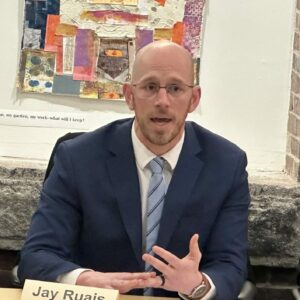Manchester Mayor Jay Ruais presented his first budget to city leaders Thursday night, telling them he is grappling with lower city revenue, funding shortfalls created by the last administration, and exploding healthcare costs.
But, he added, it’s still a budget that will help the city grow.
“If I’ve said it once, I’ve said it a thousand times: Ours is a city filled with undeniable and unquantifiable promise, and this budget responsibly funds our potential,” Ruais said.
He presented his proposed $189 million city budget and $227 million school budget Thursday night in the aldermanic chambers. Despite economic pressures that include a more than $3 million hole, Ruais’ spending proposal comes in with a 3.86 percent increase, well under the 5.6 percent tax cap limit.
“We had to make tough decisions,” Ruais said.
Ruais’s predecessor, Democrat Joyce Craig, left him with a $1.7 million funding gap after she used federal COVID relief funds to cover ongoing expenses in her last city budget. Add to that an overage in city employee healthcare costs of $1.4 million, and a dramatic drop in new revenue from $4.5 million last year to $166,000 this year.
Craig is now running for the Democratic gubernatorial nomination.
Ruais’s proposal freezes hiring in the city, eliminates funding for vacant positions, and cuts city department requests by almost $2 million. Ruais said his budget focuses on growing the city and strengthening its finances for the future. That means he’s also cutting the bonding that future generations will pay by 10 percent and leveling funding of city departments.
The budget does not include any layoffs, however. City employees will be receiving a 4 percent cost of living adjustment. Ruais’ budget focuses on education, public safety, quality of life, and ending the homeless crisis.
He wants to use $1.65 million in federal funds to build 45 affordable housing units, as well as funding for programs like Families in Transition, which would receive $70,000 for family emergency housing; WayPoint would receive $89,000 for its homeless youth shelter; YWCA would receive $70,000 for Emily’s Place; and 1269 Café would receive $50,000 to double its residential room capacity.
Those investments would help prevent the city from relying on emergency shelters, which are expensive and not long-term solutions for homeless people.
Importantly, Ruais does not want to keep using limited funding to create new and ongoing expenses for taxpayers. The city’s homeless engagement center came together with federal funds which are now running out. Instead of putting that expense onto the tax rolls, Ruais wants to use remaining ARPA funds to keep the center as a non-profit not funded by the city.
“ARPA has fully funded the engagement center since its inception; and those funds run out on June 30. I don’t believe cities should be in the shelter business, and we do not have the resources to fund this in the long term. We should take this opportunity to transition from a city run shelter, to that of a nonprofit,” Ruais said. “What I am proposing today is that we take a portion of the ARPA money we have left to build a transitional bridge to the nonprofit that will take over. This is an important strategy allowing us to address these real challenges without having the taxpayer bear the full burden.”
Ruais also wants to see increased spending in the city welfare department to keep people from falling through the cracks and ending up homeless. This type of humane investment in people is good for the community and the taxpayer, he said.
Manchester’s police and fire departments aren’t expected to shoulder any cuts. Ruais is making sure 10 officers funded through a federal COPS grant will continue, as will the six new officers hired since January. Mental health funding for officers will also continue. Firefighters are getting $100,000 in new protective gear to keep them safe on the job.
“You have our back, and this budget has yours,” Ruais said.
While the school part of the proposal, $227 million, may not be everything the district is seeking, Ruais said it is a solid compromise and a generous allocation.
“We were able to invest an additional $1 million into our school district. The $227 million we are proposing to allocate this evening represents the most ever allocated by the City of Manchester,” Ruais said.
The budget includes more than $5 million in funding for road repairs and funding to incentivize property owners to beautify their downtown buildings with the aim of attracting people and businesses to the city. Additionally, Ruais proposes investing in parks and youth sports to enhance the quality of life.




